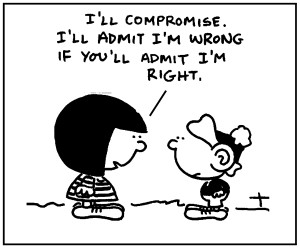 We are reluctant to say them, but when spoken honestly and appropriately, three simple phrases can help maintain our personal integrity and sustain peace in relationships.
We are reluctant to say them, but when spoken honestly and appropriately, three simple phrases can help maintain our personal integrity and sustain peace in relationships.
“I don’t know.”
Often, when we don’t know something, we make stuff up. When we don’t know the answer to a question, we attempt to answer it anyway. Instead, we should just say, “I don’t know.”
In his must-read-book, In The Kingdom of Ice, Hampton Sides writes that in the late 1800s no one knew what the North Pole was like because no one had ever been there. The most famous cartographer of the day was a German professor named August Petermann. He was, supposedly, the world’s foremost authority on world geography. The world wanted to know what the Arctic was like, so Petermann wrote, “It is a well-known fact that there exists to the north of the Siberian coast, and, at a comparatively short distance from it, a sea open at all seasons.” He firmly believed that when a team of explorers finally reached the North Pole, they would find a tropical environment, complete with palm trees and perhaps a new race of humans.
Huh? Why didn’t he just say, “I don’t know”?
When was the last time you said, “I don’t know.”? I admire people who use the phrase; I have little regard for people who should but don’t. There’s no shame in admitting that you simply don’t know.
“I made a mistake.”
When I hear someone say, “I made a mistake,” my admiration for that person escalates. My regard is diminished when there is stubborn refusal to admit the obvious. Politicians and leaders, in particular, are reluctant to admit mistakes, but it’s nearly impossible not to make mistakes when you’re leading aggressively and making a lot of decisions. To err is human.
Even when we do admit that a mistake was made, we have a hard time using the personal pronoun “I.” When Richard Nixon commented on Watergate, when Ronald Reagan talked about the Iran-Contra affair, and when Hillary Clinton spoke about Whitewater, they used the phrase, “Mistakes were made.” That doesn’t quite hit the nail on the head, does it?
Compare these responses to the most famous unsent message in history. General Eisenhower penned the following memo before the Normandy Invasion. Fortunately, it was never posted because the invasion was successful.
“Our landings…have failed..and I have withdrawn the troops. My decision to attack at this time and place was based upon the best information available. The troops, the air and the Navy did all that bravery and devotion could do. If any blame or fault attaches to the attempt it is mine alone.”
When was the last time you said, “I made a mistake”?
“I was wrong; please forgive me.”
Only an infallible person can avoid saying this phrase, and you and I don’t qualify. Speaking this phrase doesn’t make you a bad person; it simply means that you messed up and want to make it right.
I once counseled a couple struggling in their marriage. In one of the sessions I asked the husband, “How long has it been since you’ve spoken these words to your wife: ‘I was wrong; please forgive me.’” Awkward silence ensued. At least he was honest when he replied, “Never.” They had been married 22 years.
I appealed to his logic: “What is the probability that in 22 years of marriage, you have never hurt or offended your wife?” Again, he was honest in saying, “The chances are slim.” Their homework assignment was rather obvious: identify ways in which you have hurt your spouse; admit it; and ask forgiveness.
When was the last time you said, “I was wrong; please forgive me.”?
Summary
What? – We are reluctant to speak these three phrases, but we should.
So what? – We gain credibility with our family and friends when we speak these phrases, when appropriate.
Now what? – When was the last time you spoke each of these phrases? In the coming weeks, find an appropriate time to speak each one.
Leaders – Leaders are often reluctant to use these phrases, thinking that doing so will diminish their standing among their followers. But just the opposite is true. Leaders actually lose credence when they should speak the phrases but do not, and gain respect when they do.
 In a banal setting and at an inconvenient time, would people pause to observe transcendent beauty?
In a banal setting and at an inconvenient time, would people pause to observe transcendent beauty?


